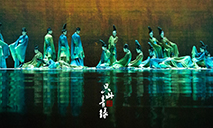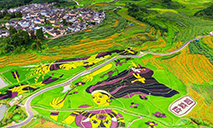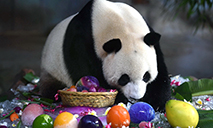Hybrid rice trial sees major success

Yuan Longping checks rice at a base in South China's Hainan province, on April 2, 2004. (Photo by Huang Yiming / chinadaily.com.cn)
Renowned agricultural expert Yuan Longping, known as the "father of hybrid rice", died in May at the age of 91, but his legacy lives on, most recently with the successful trial planting of his giant rice variety in Chongqing's Dazu district.
One hectare of 2-meter-tall giant rice plants, a hybrid developed through a process of heterosis-in which a crossbred hybrid is superior to its parents-was hailed as a success in August in Dazu district.
The new rice variety seems to thrive despite the area's relatively higher temperatures, which are usually not ideal for the crop.
The giant rice plants, grown in Changhong, a village in Dazu's Shiwan township, will be harvested at the end of September and have an estimated yield of 12 metric tons per hectare-a significant increase over the 9 metric tons per hectare typically expected with rice. The hybrid plants are twice as tall as standard varieties.
Chen Yangpu, deputy director of the Chongqing branch of the China National Hybrid Rice Research and Development Center, said the giant rice, which has straight, darker leaves, has greater photosynthetic efficiency-the amount of light energy converted into chemical energy-than regular rice.
"The technical difficulty lies in the thickening of the rice stalks and the quality of the rice grains," said Luo Zhiqiang, production technology director of Chongqing Dazu Yuanpin Agricultural Development Co. By improving the thickness of the stalks, the plants can grow taller and yield more rice. This breakthrough took more than 10 years of research, he added.
The new variety is resistant to heat, diseases, flooding, salt-alkali soil and lodging-where a stalk is bent close to the ground, making the grain difficult to harvest and reducing the yield. The hybrid also provides an ideal habitat for aquatic creatures and mammals, whose excrement adds nutrients to the plants.
A project to plant 1,333 hectares of rice and introduce aquatic animals is planned in Dazu district, following on the heels of the success of the giant hybrid rice, Luo said. The hybrid field can accommodate more water, making it possible to breed fish, shrimp and crabs in the same paddy.
"Normal rice can yield a profit of $930 to $1,155 per hectare, but planting giant rice and raising aquatic animals together may help farmers increase profits by a factor of five or six," Luo said. "The farmers have shown interest. So this could be a good new project for the nation's rural vitalization strategy."
The strategy, first proposed in the report to the 19th National Congress of the Communist Party of China in 2017, promotes the protection of arable land resources, traditional villages and rural features, and the improvement of the rural living environment.
Luo said his group is focusing on the trial of the Dazu sample and is looking forward to spreading it to the rest of the country in the future.
Next year, the center is planning to expand the planting area of the hybrid rice across Chongqing. It has also been planted in Hunan, Guangdong and Jiangsu provinces, and in the Guangxi Zhuang autonomous region.
"Larger areas of hybrid rice can be harvested by machinery," said Luo.
Dream realized
Chen, the development center director, said the giant rice "represents the realization of Yuan's dream".
Yuan began researching hybrid rice in 1964 and succeeded in cultivating the world's first high-yield strain in 1973. In his work, spanning more than five decades, he helped China work a great wonder-feeding nearly one-fifth of the world's population with less than 9 percent of the world's total arable land.
Yuan once said he had two dreams: to "enjoy the cool shade beneath rice plants taller than men "and to see hybrid rice grown all over the world to help solve the global food shortage.
Photos
 Dance show saluting traditional culture of the Song Dynasty makes its debut
Dance show saluting traditional culture of the Song Dynasty makes its debut Village in SW China’s Yunnan embraces prosperity through agricultural tourism
Village in SW China’s Yunnan embraces prosperity through agricultural tourism Eighth birthday for pair of giant pandas celebrated in Haikou, Hainan province
Eighth birthday for pair of giant pandas celebrated in Haikou, Hainan province Olympic gold medalists portrayed in Shanxi artist’s polymer clay sculptures
Olympic gold medalists portrayed in Shanxi artist’s polymer clay sculptures
Related Stories
Copyright © 2021 People's Daily Online. All Rights Reserved.






